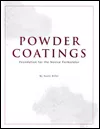Grinding of Powder Coatings

The Retsch Ultracentrifugal Mill is ideally suited for this purpose and has been the instrument of choice by powder coatings manufacturers worldwide for decades. The model ZM 200 is the fourth-generation mill of its type and a further-improved design of its proven predecessors ZM 1, ZM 1000 and ZM 100.
The sample to be ground is fed to the mill through the hopper and then proceeds to the grinding chamber. Size reduction takes place by impact and shearing forces between a rotor, spinning up to 18,000 rpm and a fixed ring sieve. Ring sieves can be supplied with various mesh sizes, which help determine the ultimate grind size of the material being processed. As a rule of thumb, 70% of the ground material will be half the mesh size of the sieve used. For example, when a 1 mm sieve is installed, 70% of the sample will be smaller than 0.5 mm. The sample is collected in the cassette, which can be removed together with the sieve for quick cleaning.
Powder coatings do present a challenge to any grinding process since, by design, the material will melt at a given temperature, making it difficult to grind to a fine powder due to the naturally produced frictional heat generated during grinding. With the high speed and multiple grinding forces involved, the sample is in the grinding chamber for a very short time, which reduces any likelihood of the material overheating and melting. However, it is still possible to melt the material either through feeding the material too quickly or through using too fine a sieve. Various grades of powder coatings are more sensitive than others to these issues.
The problem of feeding too quickly can be easily addressed by using a controlled vibratory feeder (Retsch DR 100) and for overheating, by using a ring sieve that will provide as fine a grind size as possible without melting the material. Keeping the rule above in mind, the sieve to be used is twice the required size of the ground product.
For temperature-sensitive materials, specially designed distance sieves have proven to be extremely successful. In powder coatings applications, the smallest sieve to produce good results is the distance sieve 0.2 mm. The use of a cyclone collection system with its improved air flow reduces the temperature in the grinding chamber and allows for the processing of batches up to 4.5 liters. The method does not require the use of a coolant (liquid nitrogen or dry ice), which proves to be an advantage given the cost and safety issues in handling these substances. The typical configuration of the ZM 200 for grinding powder coatings is: 12-tooth rotor of stainless steel; distance sieve 1.0 mm, 0.75 mm, 0.5 mm, 0.25 mm or 0.2 mm; feeding kit DR 100; cyclone with 3 L or 5 L receptacle. In most cases, sample batches produced in the rotor mill will contain some larger particles that can be easily removed by sieving using a Retsch AS 200 sieving system or equivalent.
The Ultra Centrifugal Mill ZM 200 is versatile and easy to use, and all parts that come into contact with the sample can be removed for cleaning. With its sturdy, high-quality design it has become the standard mill in virtually every powder coatings lab.
Retsch is a German manufacturer of equipment for milling and sieving on a laboratory scale. The line of mills and crushers, test sieves and sieve shakers, as well as sample dividers, feeders and driers has won international reputation in industry and research for its excellent design and long service life. The U.S. subsidiary is located in Newtown, PA, and provides customer support including the processing of samples as well as after-sales service.
For further information, e-mail frank.bath@retsch-us.com, visit www.retsch-us.com or call 866/473.8724.
Looking for a reprint of this article?
From high-res PDFs to custom plaques, order your copy today!





